广州七年级英语下册U1U4复习
2019-2020广州七年级下册英语U1-U8语法归纳大全 (1)
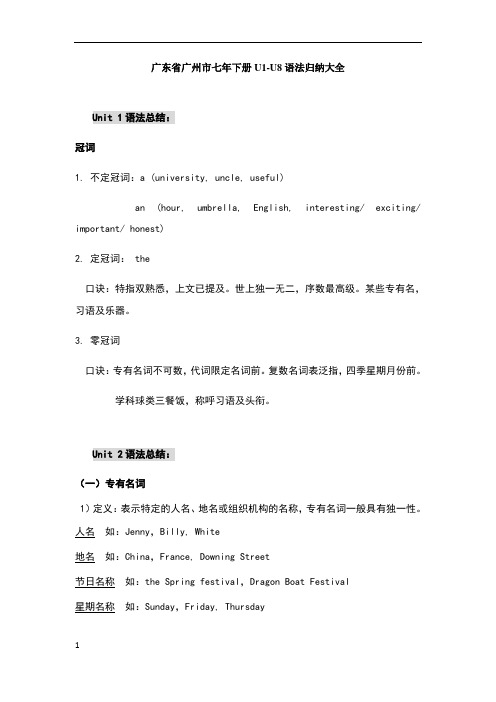
v1.0 可编辑可修改广东省广州市七年下册U1-U8语法归纳大全Unit 1语法总结:冠词1. 不定冠词:a (university, uncle, useful)an (hour, umbrella, English, interesting/ exciting/ important/ honest)2. 定冠词: the口诀:特指双熟悉,上文已提及。
世上独一无二,序数最高级。
某些专有名,习语及乐器。
3. 零冠词口诀:专有名词不可数,代词限定名词前。
复数名词表泛指,四季星期月份前。
学科球类三餐饭,称呼习语及头衔。
Unit 2语法总结:(一)专有名词1)定义:表示特定的人名、地名或组织机构的名称,专有名词一般具有独一性。
人名如:Jenny,Billy, White地名如:China,France, Downing Street节日名称如:the Spring festival,Dragon Boat Festival星期名称如:Sunday,Friday, Thursday月份名称如:May,July, September组织机构名称如:the Red Cross,Asian Development Bank书籍报刊名称如:China Daily,New York Times, Daily Mirror2)注意事项:① 一般情况,专有名词的第一个字母大写,前面不能用不定冠词“a”或“an”,通常没有复数形式。
Eg:Beijing is the capital of China.② 有时专有名词可以转化成普通名词,转化后它具有普通名词的特性,可以在其面前加不定冠词“a”也可以在词尾加表示复数形式的“s”。
Eg:A Mr Green called just now.③ 姓氏是专有名词,一般情况下,没复数形式,前面也不能加定冠词“the”。
但如果姓氏前面加定冠词“the”,并后面加上“s”时。
则表示“一家人”(其谓语用复数)。
最新广州牛津版英语七年级下-u1-u4-知识大集中
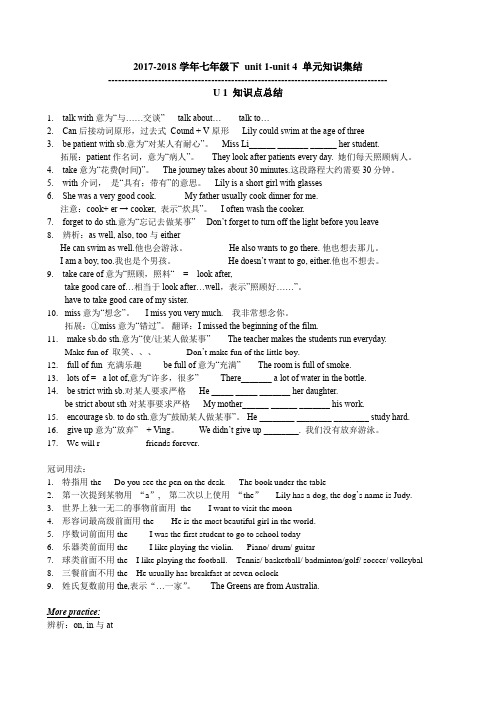
2017-2018学年七年级下unit 1-unit 4 单元知识集结------------------------------------------------------------------------------------U 1 知识点总结1. talk with 意为“与……交谈”talk about…talk to…2. Can后接动词原形,过去式 Cound + V原形Lily could swim at the age of three3. be patient with sb.意为“对某人有耐心”。
Miss Li______ _______ ______ her student.拓展:patient作名词,意为“病人”。
They look after patients every day. 她们每天照顾病人。
4. take意为“花费(时间)”。
The journey takes about 30 minutes.这段路程大约需要30分钟。
5. with 介词,是“具有;带有”的意思。
Lily is a short girl with glasses6. She was a very good cook. My father usually cook dinner for me.注意:cook+ er → cooker, 表示“炊具”。
I often wash the cooker.7. forget to do sth.意为“忘记去做某事”Don’t forget to turn off the light before you leave8. 辨析:as well, also, too与eitherHe can swim as well.他也会游泳。
He also wants to go there. 他也想去那儿。
I am a boy, too.我也是个男孩。
He doesn’t want to go, either.他也不想去。
七年级下册Unit1Unit4考点讲义

第三讲七年级下册Units 14基础知识梳理【话题】Unit 1: joining a club Unit 2: Daily routinesUnit 3: Transportation Unit 4. : Rules【词汇总结】名词:1 吉他____________ 2. 国际象棋__________ 3. 倶乐部;社团_________ 4. 故事_______ 5.鼓____________ 6. 人;人们___________ 7. 周末_____________ 8. 音乐家__________ 9.牙齿___________ 10.工作;职业_________ 11.晚上;夜晚_________ 12. 组;群_________ 13.一刻钟________ 14家庭作业___________15生活;生命__________ 16火车____________ 17.分钟___________ 18. 河;江_____________ 19. 村庄;村镇_________ 20. 桥____________ 21.小船___________ 22. 村民_______________ 23. 规则;规章________ 24.运气____________动词:1.唱歌___________2. 参加;加入__________3. 讲述;告诉______________4.写作;写字________5. 使成为;制造__________6. 教;讲授___________7 跑;奔_____________ 8. 开车______________ 9. 居住;生活___________10.横过;越过___________ 11. 离开;留下___________ 12. 听;倾听__________14.穿;越______________ 14. 带来;取来____________ 15. 放松;休息_________16 读;阅读_____________ 17. 感受;觉得____________ 18. 记住;记起___________19 遵循;跟随___________ 20 保持;保留______________ 21.学习;学会______________形容词:1.奇怪的;滑稽好笑的_________2. 新的;刚出现的__________3.害怕;畏惧__________4 抱歉的;难过的;惋惜的__________ 5. 重要的________________ 6. 安静的______________7 脏的_____________________ 8. 吵闹的_______________ 9 严格的;严厉的________副词1.通常地;一般地______________2. 很快地____________3. 有时________________兼类词1.游泳(v.n. ) ________________2. 跳舞(v.) 舞蹈(n. )____________________3 演出;节目(n. )给...看;展示(v. )________ 4.工作(v. n. ) __________________5 穿衣服(v,)连衣裙(n. ) _______________ 6. 刷;刷净(v. ) 刷子(n. ) _______________7 最好的(adj.)最好地(adv. ) _____________ 8. 锻炼;练习(v. n. ) ____________________9.早(的)(adv. adj. ) _________________ 10 打扫;弄干净(v.)干净的(adj.) __________10.品尝(v. )味道;滋味(n.) ____________ 12 远;远的(adv; adj) ________________13 在外面(adv) 外面的(adj.) ____________ 14 梦想;睡梦(n.)做梦(v.) ____________15 打架;战斗(v. n. ) ________________ 16.练习(v. n. ) ______________________【短语归纳】1.弹吉他_____________________2.下国际象棋______________3.说英语_________________4 be good at ________________5 talk to __________________6 play the drums ____________7 弹钢琴__________________8 拉小提琴________________ 9be good at __________________ 11.结交朋友_______________ 11 help (sb)with sth ____________ 12 起床;站起______________ 13 get dressed _______________ 14 take a shower ____________15 do (one’s) homework ___________16 take a walk ______________ 17 either... or.....____________ 18 lots of ____________________ 19 get to ___________________ 20 take the subway ____________ 21.ride a bike ________________ 22 by bike _________________ 23. think of ______________ 24. 在...和...之间_____________ 25 实现__________________ 26 准时_________________ 27 听...___________________28 外出(娱乐) ______________ 29 铺床_________________ 30 (对某人)要求严格_________ 【句子提炼】1, _______ you swim ? 你会游泳吗?Yes, _______ ________ 是的,我会。
Units1-4单元核心词汇复习课件人教版英语七年级下册
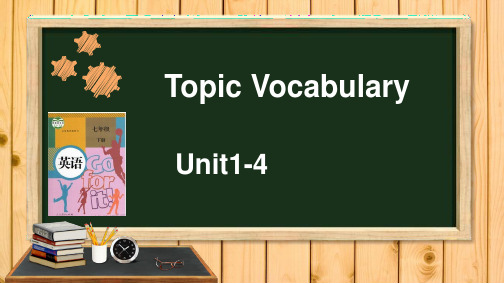
①go to school by bike = ride a bike to school ② go to school by bus = take a bus to school ③ go to school on foot = walk to school
Vocabulary
★
4. Crossing the River to School
Vocabulary
★
2. practice the guitar practice [ˈpræktɪs] v. 练习
eg. She practices playing the piano every day. practice doing sth. 练习做某事
eg.Practice makes perfect. eg.It’s his practice to read two books a week. practice n. 练习;个人习惯
arrive at 小地点 ③ reach + 地点
注:“到达三兄弟”后接here, there, home之类表示地点的副词时不加介词
eg: 到家 / 到这儿 / 学校
Vocabulary
★
2. bus stop
stop [stɑp]
n. 车站
v. 停止
eg: Why not stop to have a rest
表示说某事时,强调单方面说或讲。 talk to / with sb. about sth. 强调双方交谈,常与介词about、with或to连用。
Vocabulary
★
3. They can tell you stories, and you can make friends.
【单元整合】人教版七年级下册期末单元复习unit1-unit4
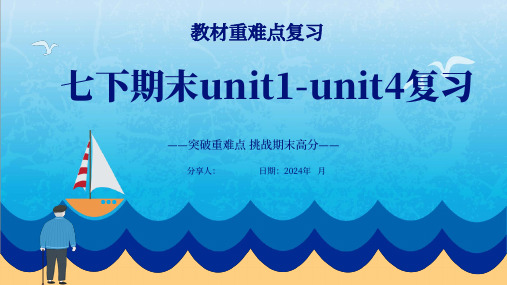
Can you help me with my English? =Can you help me (to) learn English?
考点精讲 6.either...or... 或者...或者...;要么...要么...
我想要么去美国要么去英国学习。 I want to study either in America or England.
55.remember v.记住;记起→反义词 r_e_m__e_m__b_e_r_(忘, 搭配:remember __to__d__o__ sth. 记得去做某事(未做) remember __d_o_i_n_g___ sth. 记得做过某事(已做)
记;遗忘)
56.afraid adj. 害怕;畏惧
重点词汇
8. musician n. 音乐家→ _m__u_s_ic___ n. 音乐 9. tooth n. 牙齿→ __te_e_t_h___ n. 牙齿 (复数) 10. usually adv. 通常;经常→ __u_s_u_a_l_ adj. 通常的;平常的 11. work v.& n. 工作→ _w__o_r_k_e_r n. 工人 12. funny adj. 奇怪的;滑稽好笑的→ ___fu_n___ n. 乐趣;有趣的事 13. best adj.& adv. 最好的;最好地 (最高级) → _b_e_t_te_r__ adj.& adv. 较好的;较好地 (比较级) 14. quickly adv. 很快地→ __q_u_i_ck__ adj. 很快的 15. life n. 生命→ __l_i_v_es__ n. 生命 (复数)
02
重点词组
The key phrases
人教版七年级下册英语U1--U4复习资料

Unit1 Can you play the guitar?一、短语:play the guitar 弹吉他play the piano 弹钢琴play the trumpet吹喇叭play the drums 敲鼓play chess 下象棋speak English 说英语speak a little English 说一点英语say it in English 用英语说它join the art club 加入艺术俱乐部join the basketball club加入篮球俱乐部join the swimming club加入游泳俱乐部what club 什么俱乐部play the guitar well 弹吉他弹得好be good with sb和某人相处的好be good for···对······有益处be good at···擅长······help sb with sth help sb do sth帮助某人干某事do Chinese kung fu表演中国功夫be in参加,加入call sb at + 电话号码给某人打电话拨打···号have an e- mail address 有电子邮件的地址rock band 摇滚乐队 a little 一点(后接不可数名词)in the music room 在音乐教室里show sth to sb = show sb sth 把某物给某人看二、短语和语法:1. — Can you play the guitar? 你会弹吉他吗?—Yes, I can. 是的,我会。
—No, I can’t. 不,我不会。
①情态动词can的用法:情态动词无人称和数目的变化,不能独立使用作谓语,后面必须接动词原形,情态动词和动词原形一起构成谓语。
广州版七年级英语下Unit1知识点总结(可供期末期中平时复习)
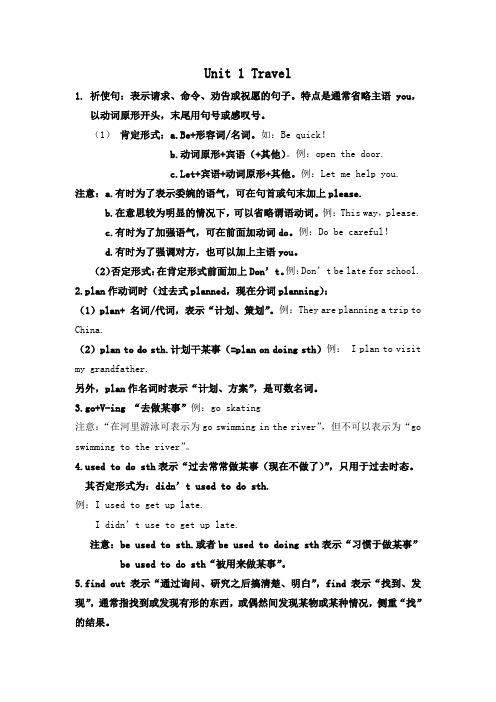
Unit 1 Travel1.祈使句:表示请求、命令、劝告或祝愿的句子。
特点是通常省略主语you,以动词原形开头,末尾用句号或感叹号。
(1)肯定形式:a.Be+形容词/名词。
如:Be quick!b.动词原形+宾语(+其他)。
例:open the door.c.Let+宾语+动词原形+其他。
例:Let me help you.注意:a.有时为了表示委婉的语气,可在句首或句末加上please.b.在意思较为明显的情况下,可以省略谓语动词。
例:This way,please.c.有时为了加强语气,可在前面加动词do。
例:Do be careful!d.有时为了强调对方,也可以加上主语you。
(2)否定形式:在肯定形式前面加上Don’t。
例:Don’t be late for school.2.plan作动词时(过去式planned,现在分词planning):(1)plan+ 名词/代词,表示“计划、策划”。
例:They are planning a trip to China.(2)plan to do sth.计划干某事(=plan on doing sth)例: I plan to visit my grandfather.另外,plan作名词时表示“计划、方案”,是可数名词。
3.go+V-ing “去做某事”例:go skating注意:“在河里游泳可表示为go swimming in the river”,但不可以表示为“go swimming to the river”。
ed to do sth表示“过去常常做某事(现在不做了)”,只用于过去时态。
其否定形式为:didn’t used to do sth.例:I used to get up late.I didn’t use to get up late.注意:be used to sth.或者be used to doing sth表示“习惯于做某事”be used to do sth“被用来做某事”。
七下Unit1-4 知识点梳理

Useful ExpressionsUnit11. be nice / kind / good to sb. 对某人好2. be good for ... 对…有好处 be bad for …对…没好处3. live with sb. 与某人居住 live in … 住在某地4.be good at sth. / doing sthdo well in sth. / doing sth. 否定: be not good at ….. don ’t / doesn ’t do well in ….5. listen to music6. come from = be fromExample: Are you from China? = Do you come from China?7. a 12-year-old boyan 11-year-old boy ( 8, 18, 80前也是an)8. Glad / Nice to meet you.9. This is …….. (用于介绍人)10. I study at ……I ’m a student at …….Unit 21. enjoy doing sth.like to do/ like doing sth. 喜欢做某事love doing sth.2. do sport s做运动like sport s喜欢运动3. go walking / go for a walk / take a walk 散步4. really + adj. (形) 例:It’s really interesting.really + V. (动) 例:I really like English.5. walk to + 地点walk to schoolwalk home / here / there walk to my home6. What’ s your favourite sport?= What sport do you like best?What’s in the box? (不知道是单数还是复数,就用单数问)Who is knocking on the door?7.like …... very much = love ….. 非常喜欢…..don’t like …… very much 不是很喜欢……8. be in……= be a member of…. 是…. 的成员9. look + adj. 看起来……Look for 寻找look after = take care of….. 照顾look at10. well : 做形容词,仅指身体好I feel well now. 我现在感觉很好。
- 1、下载文档前请自行甄别文档内容的完整性,平台不提供额外的编辑、内容补充、找答案等附加服务。
- 2、"仅部分预览"的文档,不可在线预览部分如存在完整性等问题,可反馈申请退款(可完整预览的文档不适用该条件!)。
- 3、如文档侵犯您的权益,请联系客服反馈,我们会尽快为您处理(人工客服工作时间:9:00-18:30)。
• ugh at sb.嘲笑某人 • 13.encourage sb. to do
鼓励某人去做 • 14.spend sometime on sth. • =spend sometime in doing sth. • 花时间干某事 • 15. look like 看上去··, 看起来像···
Unit 1 练习:
6.除了雨天之外,她总是骑自行车上班。 She usually __________ ____g_o_e_s__t_o_w__o_r_k_______ by bike except on rainy days. 7.我鼓励她去参加这个会议昨天. I _e_n_c_o_u__ra__g_e_d_____ her _t_o______ attend the meeting. 8.他想成为一名医生,但他最终放弃了. He wanted to be a docotr, but he _g__a_v_e__u_p__ _________ at last. 9.我父母总是对我要求严格. My parents ___a_r_e_s__tr_ic_t_w__i_th___ _________me. 10.他既能说英语,也能说西班牙语。 He can _s_p__e_a_k_______ English and Spanish _a_s__w__e_ll__ __________
语言点:冠词的用法
I. 不定冠词的用法:a,an 1)泛指 2)a+辅音音素,an+ 元音音素 (a,e, i, o, u) 3)特殊:a useful, university, European /ju:/, an honest, hour,
II. 定冠词的用法:the
1)特指
2)表示“一家人”或“夫妇”
用an, a, the, / 填空
7. There’re many poor people in __tht_h_ee_ world. I think _t_h_e___ rich must help___th__e__ poor. 8. ___T_h_e___ Yellow River is __th_e_____ second longest river in China. 9. --- Will you get there by ___/ _____ train? ---- No, I’ll take __a______ taxi. 10. ---- My brother is playing _/____ basketball while my sister is playing __t_h_e__ piano. 11. __T_h_e__ Smiths are going to the park this Sunday. Why don’t we go for __a____ walk? 12. There are sixty minutes in_a_n__ hour.
3)用于乐器前面 4)序数词 和最高级
III. 零冠词的用法:/
具的名词前
用an, a, the, / 填空
1.There is _a_n______ “M” and ___a_____ “Y” in the word “my”. 2. My sister was ill in _/__ bed, and my mother was sitting on _t_h_e__ bed by her. 3. We have _/____ lunch at school on weekdays and we enjoy __t_h_e__ lunch very much. 4. We can’t see __th_e____ sun at __/ ____ night. But we can see the moon and the stars. 5. My brother likes playing ___/_____ football very much, but he doesn’t like playing___/_____ football 6. There is _a_n______ old man standing there. _T__h_e____ old man looks worried.
Unit 1 练习:
1.老板让工人整日整夜工作。 The boss made the workers __w__o_r_k_a_l_l_d_a_y_______ and __a_l_l _n_ig_h_t_______. 2.嘲笑残疾人是不对的。 _I_t__________ is wrong ____t_o__la_u_g_h__a_t______ __________ the disabled. 3.他们派她照顾那位老人。 They sent her to ___ta_k_e__c_a_r_e_ o__f ________ ___________ that old man. They sent her to __l_o_o_k__a_f_te_r___________ that old man. 4.这些小孩子精力充沛,他们整天跑呀玩呀。 The children ______a_re___fu_l_l _o_f_________ ____________ energy. They run and play all day. 5.如果她们听见了,又会笑话我了。 If they hear it, they___w__i_ll _m__a_k_e_f_u_n__o_f _____me again
复习U1-U4
by Lisa
Unit 1
Unit 1 重点短语
• 1. as well 也 • 2.take care of =look after
照顾,照看 • 3.tell jokes 讲笑话 • 4. make fun of 嘲弄;取笑 • 5. be strict about 对···严格 • 6. give up 放弃 • 7. go to work 上班 • 8. all day and all night 夜以继日 • 9.make friends with 与···交朋友 • 10.make sb. laugh 让某人发笑
